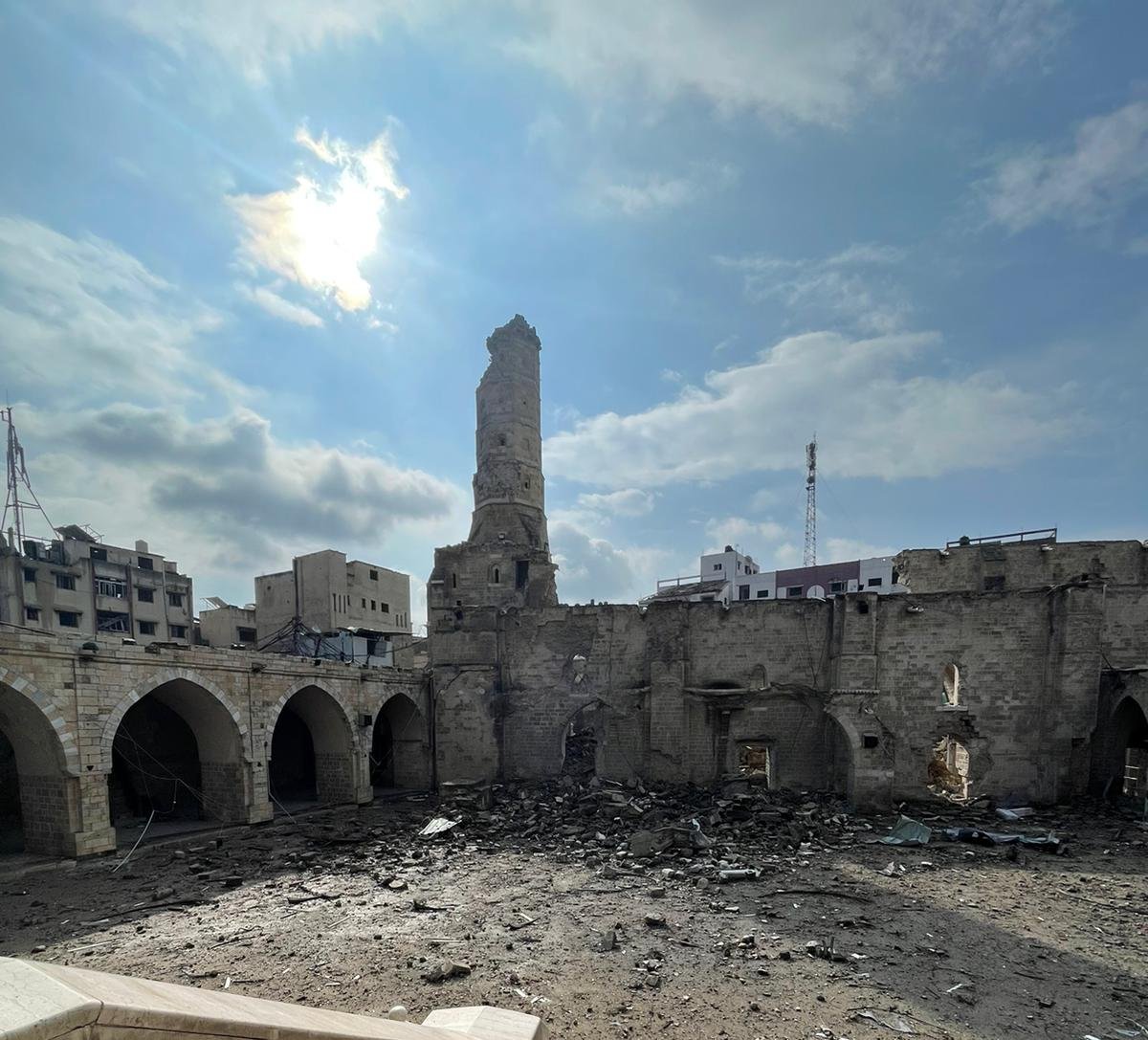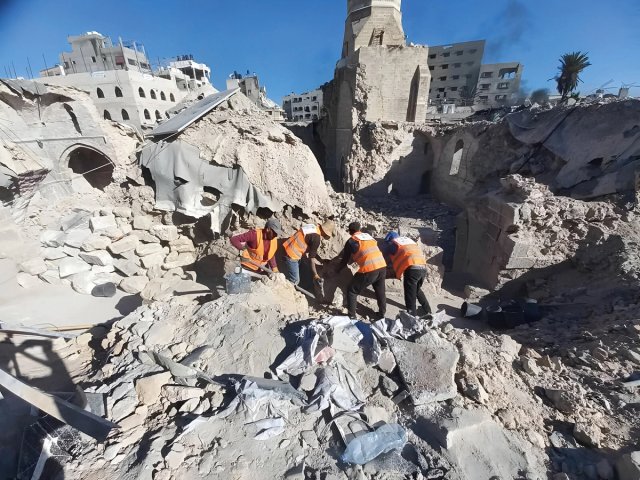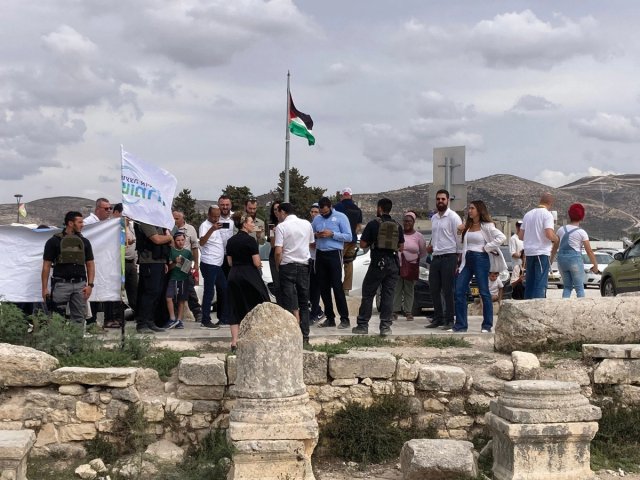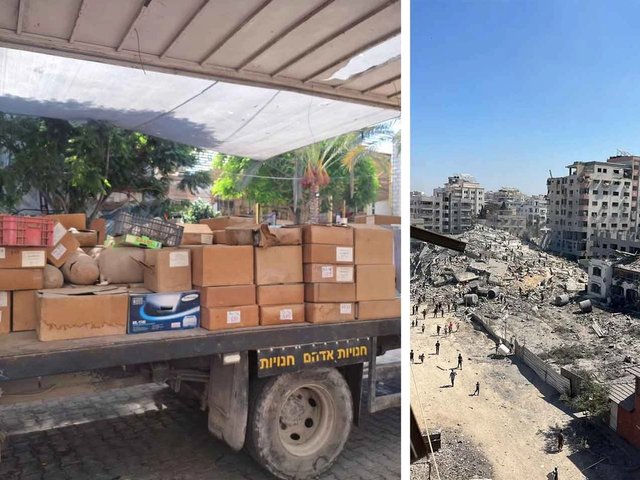Israeli attacks on cultural sites in Palestinian territory amount to war crimes and the crime against humanity of extermination, an independent UN investigative body has concluded in a report released last week.
The UN Independent International Commission of Inquiry on the Occupied Palestinian Territory including East Jerusalem and Israel examined attacks on cultural, religious and educational sites in Gaza, other occupied Palestinian territory and Israel, finding that in the majority of cases it investigated—each of which it lists—Israeli forces had committed war crimes.
The report paid special attention to heritage sites in Gaza, more than half of which have been damaged or destroyed. The report attributes this staggering statistic to Israel’s “wider campaign of devastation of civilian targets and infrastructure”.
The report focused on ten religious and cultural sites in Gaza. These included the bombing of Saint Porphyrius Church, believed to be the third oldest church in the world; the bombing, bulldozing and looting of Pasha Palace, a 14th-century Mamluk-era landmark and archaeological museum; the bombing of the seventh-century Great Omari Mosque, the enclave’s largest mosque; and the seizure, burning, bulldozing, and looting of Al Mat’haf Museum, Gaza’s first archaeological museum, which is home to an extensive private collection. The Art Newspaper previously reported on attacks on all of these sites, which took place between October and December 2023.
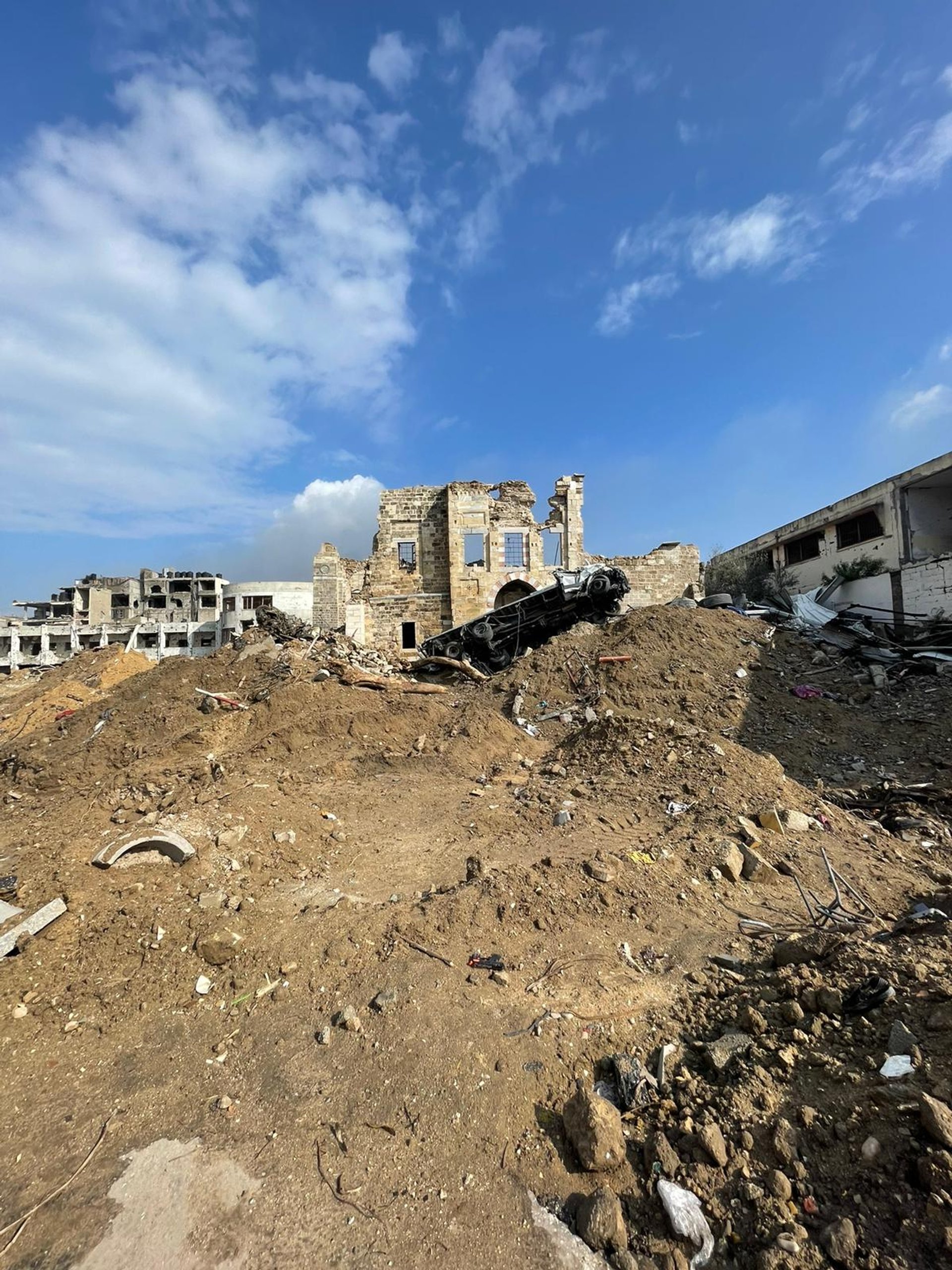
Pasha Palace, a 14th-century Mamluk-era landmark and archaeological museum that was severely damaged by an Israeli strike in 2024
Photo: Fadel Al Utol
In its legal analysis, the commission concluded that Israeli forces “knew or should have known the locations and significance” of Gaza’s prominent cultural sites and planned all military operations to avoid them. It further finds that in the majority of cases investigated—particularly those involving demolitions using explosives and bulldozers—Israeli forces committed war crimes.
These include “intentionally directing attacks against buildings dedicated to religion and historic monuments”; “intentionally launching attacks knowing they would cause damage to civilian objects which would be excessive in relation to the concrete and direct overall military advantage anticipated”; “extensive destruction of property not justified by military necessity”; and “destroying the enemy’s property without justification that necessitates such destruction”.
In the case of the Israeli attack on Saint Porphyrius Church in October 2023, which killed 19 people, including women and children, the report found that although the incident likely resulted from “collateral damage due to a targeting error,” it nonetheless constituted a war crime.
“According to international law, the destruction of cultural heritage is a crime,” Jehad Yasin, the general director at the Palestinian ministry of tourism and antiquities, tells The Art Newspaper. Emphasising the scale of the destruction, he references a report published by the ministry in February 2025, which recorded that 226 of Gaza’s 316 cultural sites had been damaged or destroyed.
Yasin, who welcomes the report, says he hopes it will compel the international community to take action to stop the war and the Israeli occupation, and to do more to protect cultural heritage in Gaza and the West Bank. “It's not only Palestinian cultural heritage, it's part of humanity’s cultural heritage. So, it's a responsibility for all to act,” he says.
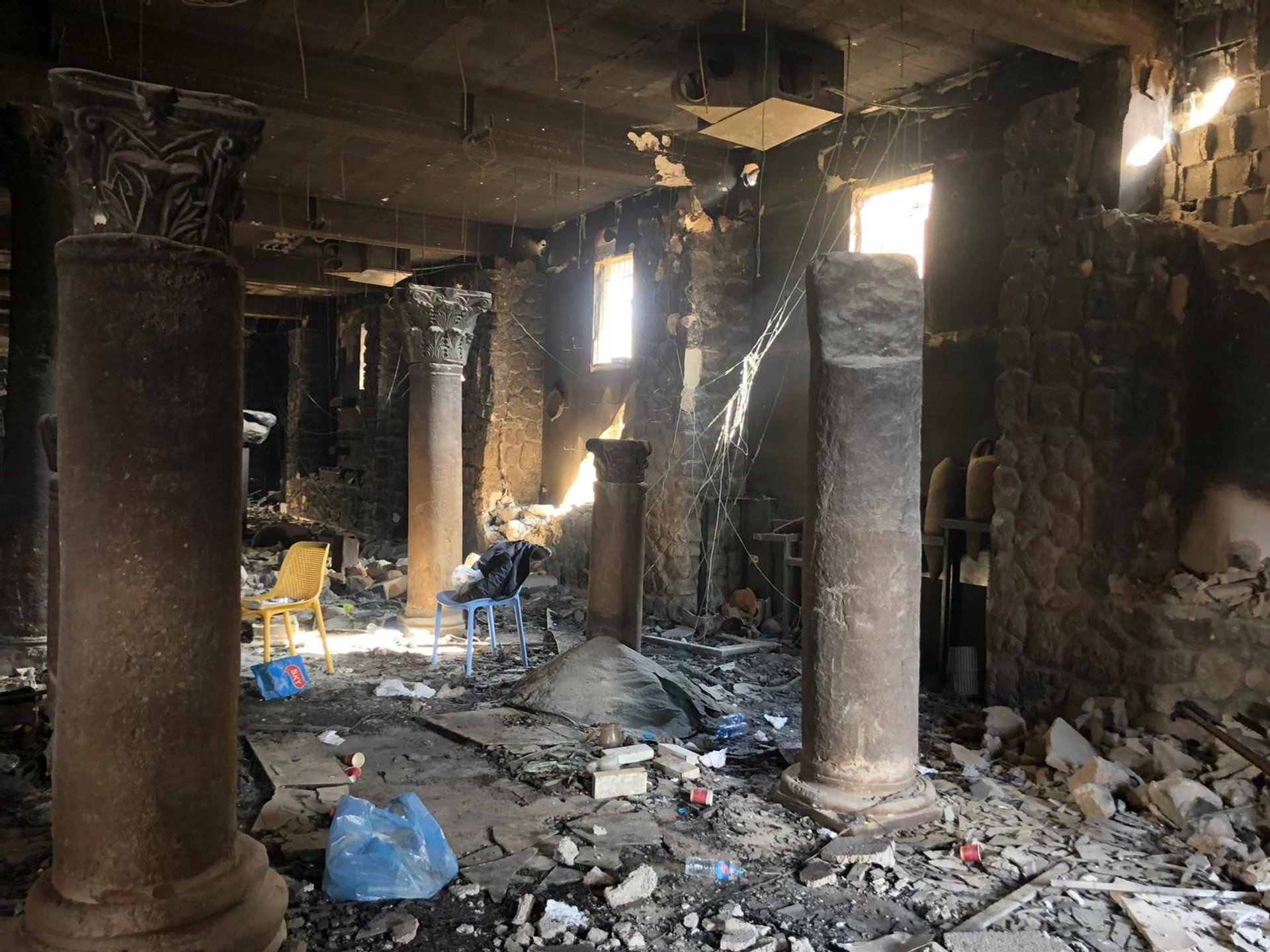
The Al Mat’haf Museum, on the coast in northern Gaza City, has been damaged and looted
Photo: Jawdat Khoudary
He adds that the situation in the West Bank is also deteriorating rapidly, and that his team is not permitted by Israel to access many Palestinian sites.
Settlements on the West Bank
The committee also examined Israeli policies and attacks in the West Bank, including the establishment of settlements in Palestinian World Heritage sites, archaeological excavations of Palestinian sites and their development into tourist attractions, and proposed Israeli laws that will transfer control of Palestinian cultural and archaeological sites to the Israeli antiquities authority. It found these actions to be unlawful.
“This is the worst-case scenario. This is what we have been fighting against—to not get to this point,” says Alon Arad, an archaeologist and chief executive officer of Emek Shaveh, an Israeli NGO that works to prevent the politicisation of archaeology in the Israeli-Palestinian context. He believes a pattern of unlawful decisions, policies, and actions—particularly under Israeli prime minister Benjamin Netanyahu’s current government, which Emek Shaveh has documented over the years—has led Israel to this point.
Still, he says, all hope is not lost. “There is an option to correct our path. Israel should embrace the recommendations that the commission has brought and return to following international law—both the humanitarian law and laws regarding cultural properties,” he says. He adds that this would require halting all archaeological and development projects in the occupied Palestinian territory and ending the destruction in Gaza.
What does the report suggest should happen next?
The top of the commission’s list of recommendations for the Israeli government is that it “immediately end the unlawful occupation of Palestinian territory, cease all new settlement plans and activities, remove all settlers and settlements as rapidly as possible in compliance with the [UN’s] International Court of Justice (ICJ) advisory opinion of July 2024 and remove all obstructions to the full exercise of the Palestinian people’s right to self-determination.”
Israel’s prime minister had rejected the court’s ruling. “The Jewish people are not occupiers in their own land—not in our eternal capital Jerusalem, nor in our ancestral heritage of Judea and Samaria,” Netanyahu said in a statement. “No decision of lies in The Hague will distort this historical truth, and similarly, the legality of Israeli settlements in all parts of our homeland cannot be disputed.”
Among the other recommendations are calls for an immediate end to attacks targeting cultural, religious and education institutions, sites and personnel; an end to the use of cultural and educational sites for military purposes; and the protection of cultural heritage, including the return of seized artefacts to Palestinian authorities.
The commission also recommends that member states comply with last year’s ICJ ruling—in which the court said Israel’s occupation of Palestinian territories violates international law—by ceasing “aiding or assisting in violations”, and by exploring “measures to ensure accountability for perpetrators of international crimes, grave human rights violations and abuses in Israel and the occupied Palestinian territory”.
Diana Buttu, an international law and humanitarian rights attorney and former legal adviser to the Palestinian Liberation Organisation and Palestinian negotiators, tells The Art Newspaper that “without a shadow of a doubt” the combination of this report, the ICJ ruling, and numerous other reports that have “documented Israel's erasure of Palestinians and Palestinian cultural institutions”—and concluded that the occupation itself is illegal—makes member states’ continued sales of weapons and business relations with Israel acts of complicity.
“We are being suffocated under the weight of these reports. [The latest report is] begging for member states to do something. It's begging the world to actually do something. Nobody can pretend that they didn't know any longer,” she says.
The report also concluded that Israeli attacks have “effectively destroyed” Gaza’s education system and identified a number of war crimes and the crime against humanity of extermination. Under Article 7(1)(b) of the Rome Statute of the International Criminal Court, extermination is defined as a crime against humanity when committed as part of a widespread or systematic attack against a civilian population, with knowledge of the attack. It includes the intentional infliction of conditions of life—such as the deprivation of access to food and medicine—calculated to bring about the destruction of part of a population.
The report found Israeli attacks on some religious sites and schools where civilians had taken refuge amounted to acts consistent with this definition.
Israel’s diplomatic mission dismissed the latest report as “an attempt to promote its fictitious narrative of the Gaza war”, and proved that its members “care more about bashing Israel than protecting the people of Gaza,” Reuters reported. Israel disengaged from the Human Rights Council in February, accusing it of bias.
The latest report also documented two attacks in Israel by Palestinian armed groups in October 2023. On 7 October 2023, an art gallery in Kibbutz Be’eri was reportedly burned and destroyed, and on 23 October, a rocket hit a museum in Kibbutz Yad Mordechai.
The commission called on the “de facto authorities in Gaza” to halt all indiscriminate firing of rockets, mortars and other munitions towards civilian populations, cease the use of civilian objects for military purposes, and implement a clear separation of military activities from civilian property and areas, in accordance with international humanitarian law.
In previous reports, the commission found that Palestinian “armed groups” committed war crimes, as well as violations and abuses of international humanitarian and human rights law on 7 October 2023 by killing and abducting Israeli children, noting that the children were subjected to physical and emotional mistreatment during the attack and while held hostage in Gaza.
The UN commission will present its findings to the Human Rights Councils on 17 June.


